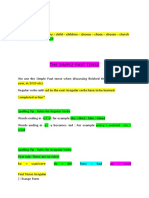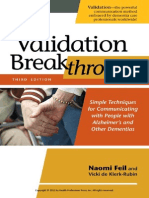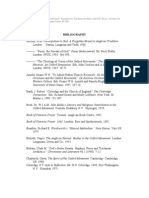0 ratings0% found this document useful (0 votes)
33 viewsHomophone&homonyms
Homophone&homonyms
Uploaded by
Priya LitThe document discusses different types of words that sound alike or are spelled alike but have different meanings: homonyms, homophones, and homographs. Examples of each type are provided along with exercises to distinguish between homonyms, homophones, and homographs.
Copyright:
© All Rights Reserved
Available Formats
Download as DOCX, PDF, TXT or read online from Scribd
Homophone&homonyms
Homophone&homonyms
Uploaded by
Priya Lit0 ratings0% found this document useful (0 votes)
33 views2 pagesThe document discusses different types of words that sound alike or are spelled alike but have different meanings: homonyms, homophones, and homographs. Examples of each type are provided along with exercises to distinguish between homonyms, homophones, and homographs.
Original Description:
Homophone&homonyms
Copyright
© © All Rights Reserved
Available Formats
DOCX, PDF, TXT or read online from Scribd
Share this document
Did you find this document useful?
Is this content inappropriate?
The document discusses different types of words that sound alike or are spelled alike but have different meanings: homonyms, homophones, and homographs. Examples of each type are provided along with exercises to distinguish between homonyms, homophones, and homographs.
Copyright:
© All Rights Reserved
Available Formats
Download as DOCX, PDF, TXT or read online from Scribd
Download as docx, pdf, or txt
0 ratings0% found this document useful (0 votes)
33 views2 pagesHomophone&homonyms
Homophone&homonyms
Uploaded by
Priya LitThe document discusses different types of words that sound alike or are spelled alike but have different meanings: homonyms, homophones, and homographs. Examples of each type are provided along with exercises to distinguish between homonyms, homophones, and homographs.
Copyright:
© All Rights Reserved
Available Formats
Download as DOCX, PDF, TXT or read online from Scribd
Download as docx, pdf, or txt
You are on page 1of 2
Homonyms| Homophones| Homograph
What are Homonyms?
The word “homonym” comes from the prefix “homo”, meaning “the same”, and the suffix “-
nym,” which means “the name”. Hence, Homonyms are words that sound alike and have
different meanings. They sound the same or are spelled the same, but their meanings differ.
Homonym Examples:
1. Address – location/ to speak to
2. Bark – the sound of dogs/ tree’s outer layer
3. Band – a ring/ a musical group
What are Homophones?
Homophones sound the same but have different meanings and have different spellings too. An
etymological breakdown of the word can help you remember what it means: Homos is the
Greek word for “same,” and phone means “sound.”
Homophones Examples:
1. Altar/ Alter: Altar: an elevated place or structure for religious rites. Alter: to change or
modify
2. Berth/ Birth: Berth: a built-in bed on a train or boat; a space for a boat to dock.
Birth: being born; a beginning.
3. Cast/ Caste: Cast: a group of actors or individuals. Caste: a social class; a rigid system of
social distinctions.
4. Days/ Daze: Days: During the daytime on every day or most days. Daze: To stun, as
with a heavy blow or shock; stupefy.
5. Earn/ Urn: Earn: acquire or deserve by one's efforts or actions. Urn: a large vase that
usually has a pedestal or feet.
What are Homographs?
Homographs are words that are spelled the same but have different meanings and sometimes
pronunciation.
Homographs Examples:
1. Entrance – the way in/ to delight
2. Bow – to incline/ type of knot
3. Bat – an animal/sports equipment
Homonym Exercise:
1. (a) I hope you are not lying to me. (a) telling a lie
(b)My books are lying on the table. (b) being in a horizontal position
2. (a) The kids are going to watch TV tonight. (a) look at
(b) What time is it? I have to set my watch. (b) small clock worn on the wrist
3. (a) Which page is the homework on? (a) one sheet of paper
(b) Please page the doctor if you need help. (b) to call someone on an electronic pager
4. (a) Let’s play soccer after school. (a) participate in a sport
(b) The author wrote a new play. (b) theater piece
5. (a) Ouch! The mosquito bit me! (a) past tense of bite
(b) I’ll have a little bit of sugar in my tea. (b) a tiny amount
6. (a) My rabbits are in a pen outside. (a) an enclosed area
(b) Please sign this form with a black pen. (b) a writing instrument which uses ink
Homograph Exercise:
1. (a) The wind is blowing hard. (a) moving air (rhymes with pinned)
(b) I have to wind my clock. (b) turn the stem (rhymes with find)
2. (a) The singer made a low bow to the audience. (a) bend at the waist (rhymes with
how)
(b) Maria placed a red bow on the birthday gift. (b) decorative ribbon (rhymes with so)
3. (a) All the students are present today. (a) here (rhymes with pleasant)
(b) The boss will present the award at 10:00. (b) give (rhymes with resent)
4. (a) Please close the door. (a) shut (rhymes with toes)
(b) The boy sat close to his uncle. (b) near (rhymes with dose)
5. (a) The rope was wound around his ankles. (a) tied around (rhymes with pound)
(b) The soldier received a wound in the battle. (b) an injury (rhymes with moon)
6. (a) I don’t know if I will live or die. (a) to have life (rhymes with give)
(b) Last night I saw the band play live in concert. (b) in real-time performance (rhymes
with hive)
Homophone Exercise:
1. Please try not to (waste, waist) paper.
2. Can I go to the party (to, too, two)?
3. This is my favorite (pare, pair, pear) of jeans.
4. I (sent, scent, cent) a letter to my aunt in Vietnam.
5. The children got (bored, board) during the lecture.
6. Mr. and Mrs. Rodriguez like to work in (there, they’re, their) garden.
You might also like
- Neumatic Integration & Interpretation a Theory In Musicology Resource Guide: Soundwave Technology, introducing ZIP (Zeus Integral Pulse)From EverandNeumatic Integration & Interpretation a Theory In Musicology Resource Guide: Soundwave Technology, introducing ZIP (Zeus Integral Pulse)No ratings yet
- Homonyms, Homographs, HomophonesDocument2 pagesHomonyms, Homographs, HomophonesVimala Thevy100% (1)
- 5 Homonyms Homophones HomographsDocument3 pages5 Homonyms Homophones HomographsASWIN SNo ratings yet
- HomonymsDocument31 pagesHomonymsagathiyannvNo ratings yet
- Homonyms, Homographs HomphonesDocument2 pagesHomonyms, Homographs HomphonesREHANRAJNo ratings yet
- Homonyms, Homographs, HomophonesDocument2 pagesHomonyms, Homographs, HomophonesEthz ColomaNo ratings yet
- Eng Digi PrintDocument2 pagesEng Digi PrintGarima2009No ratings yet
- 02.3.1 Pronunciation Lecture and Practice - 10IGCSEDocument49 pages02.3.1 Pronunciation Lecture and Practice - 10IGCSESpenser LemaichNo ratings yet
- Hom WordsDocument32 pagesHom WordsVanessa Grace Peradilla HainoNo ratings yet
- Homophones HomonymsDocument36 pagesHomophones HomonymsAdipNo ratings yet
- E10 Unit 12 Language FocusDocument35 pagesE10 Unit 12 Language FocusHa TranNo ratings yet
- Homonyms Homographs HomophonesDocument2 pagesHomonyms Homographs Homophonesapi-239499319No ratings yet
- Module 2 Lesson 3-4-AssignmentDocument4 pagesModule 2 Lesson 3-4-AssignmentAlyka mae PigaoNo ratings yet
- Homo GraphsDocument24 pagesHomo GraphsAdipNo ratings yet
- Form 2 English NotesDocument90 pagesForm 2 English Noteswilliammakoba126No ratings yet
- HomonymsgraphsphonesDocument15 pagesHomonymsgraphsphonesCarlito Salazar Cueno Jr.No ratings yet
- Homonyms Homophones Homographs 2519Document4 pagesHomonyms Homophones Homographs 2519jackeline gayoso berrospiNo ratings yet
- Олимпиада по английскому языку 7 классDocument5 pagesОлимпиада по английскому языку 7 классsamsungsu292No ratings yet
- Form 2 English NotesDocument89 pagesForm 2 English NotesatikahNo ratings yet
- Phonetics and Phonology Practice 2022Document4 pagesPhonetics and Phonology Practice 2022Eduardo EltonNo ratings yet
- Study Questions: Televisionhas The Feature ( Animate) - (B) The Verb Write Requires ADocument4 pagesStudy Questions: Televisionhas The Feature ( Animate) - (B) The Verb Write Requires AismaeelNo ratings yet
- Homonyms Directions: Choose The Letter of The Correct Answer. Homonyms Directions: Choose The Letter of The Correct AnswerDocument2 pagesHomonyms Directions: Choose The Letter of The Correct Answer. Homonyms Directions: Choose The Letter of The Correct Answerkrisyz24No ratings yet
- World English 1ADocument4 pagesWorld English 1AahgabssNo ratings yet
- Bài tập năng lực 6 - U4Document14 pagesBài tập năng lực 6 - U4n NomnomNo ratings yet
- Materi B InggrisDocument9 pagesMateri B InggrisHandi kristiantoNo ratings yet
- CBO GRADE7ºHomonimas y HomofonasDocument1 pageCBO GRADE7ºHomonimas y HomofonasJavier Ivan DuqueNo ratings yet
- He New Shoes For The WeedingDocument20 pagesHe New Shoes For The Weedingesmeyo0% (1)
- InglesDocument13 pagesInglesmessiasNo ratings yet
- De Cuong On Tap Tieng Anh 8 Hoc Ki 1Document15 pagesDe Cuong On Tap Tieng Anh 8 Hoc Ki 1thanh vo huynhNo ratings yet
- Complete These Sentences With One WordDocument8 pagesComplete These Sentences With One WordAnca AncaNo ratings yet
- Present Perfect ExercisesDocument7 pagesPresent Perfect Exercisesgzyena99No ratings yet
- Oddities of English LanguageDocument7 pagesOddities of English LanguageMădălina Andreea DîrdărăNo ratings yet
- Chira Eugenia, Filologie, 302BDocument6 pagesChira Eugenia, Filologie, 302BHîncu EugeniaNo ratings yet
- Jonathan White. Phonics - I Scream, You Scream HandoutDocument4 pagesJonathan White. Phonics - I Scream, You Scream HandoutLuis Navarro OrtizNo ratings yet
- Underline The Correct Answer Present Continuous: IngDocument3 pagesUnderline The Correct Answer Present Continuous: IngNay MojarrangoNo ratings yet
- Pronunciation: Consonants: Prof. Shirley Santiago de Jiménez English 115Document23 pagesPronunciation: Consonants: Prof. Shirley Santiago de Jiménez English 115Vannia_EstrellaNo ratings yet
- Incomplete: This List Is You Can Help byDocument21 pagesIncomplete: This List Is You Can Help byAnonymous HDGTsMfqNo ratings yet
- Phonetics and PhonologyDocument80 pagesPhonetics and PhonologyBruno Gualberto100% (1)
- Will & Be Going ToDocument6 pagesWill & Be Going ToLan Vy NguyễnNo ratings yet
- Final QuizDocument5 pagesFinal QuizNova Hasiholan MangunsongNo ratings yet
- Homographs and Homophones: Lecture #2Document31 pagesHomographs and Homophones: Lecture #2Liezl ArriolaNo ratings yet
- EnglishDocument25 pagesEnglishmischamareNo ratings yet
- Subject Verb Agreement AdvancedDocument6 pagesSubject Verb Agreement AdvancedSliverNo ratings yet
- Pronunciation Practice With Chinese Subs - 86499Document54 pagesPronunciation Practice With Chinese Subs - 86499Balu Alejandro BaluNo ratings yet
- GrammarDocument23 pagesGrammarRania singerNo ratings yet
- Rezolvare TemaDocument2 pagesRezolvare TemaLarisa FilipoaiaNo ratings yet
- 7 English g7 OKDocument2 pages7 English g7 OKReshiele FalconNo ratings yet
- Adjective or Adverb PDFDocument13 pagesAdjective or Adverb PDFstephanieNo ratings yet
- Pronunciation CH TCHDocument5 pagesPronunciation CH TCHLai OliveiraNo ratings yet
- English Grammar Exercises With Answers Part 3: Your Quest Towards C2From EverandEnglish Grammar Exercises With Answers Part 3: Your Quest Towards C2No ratings yet
- English / Esperanto Phrasebook: Words R Us Bilingual Phrasebooks, #48From EverandEnglish / Esperanto Phrasebook: Words R Us Bilingual Phrasebooks, #48No ratings yet
- Homophones: Sonic Wonders: H Ä M- ? - Fon Hom = Same Phone = SoundFrom EverandHomophones: Sonic Wonders: H Ä M- ? - Fon Hom = Same Phone = SoundNo ratings yet
- InExActArt - The Autopoietic Theatre of Augusto Boal: A Handbook of Theatre of the Oppressed PracticeFrom EverandInExActArt - The Autopoietic Theatre of Augusto Boal: A Handbook of Theatre of the Oppressed PracticeNo ratings yet
- Kids' Guide to Playing the Piano and Keyboard: Learn 30 Songs in 7 Easy LessonsFrom EverandKids' Guide to Playing the Piano and Keyboard: Learn 30 Songs in 7 Easy LessonsNo ratings yet
- Prison Lit OutlineDocument2 pagesPrison Lit OutlinePriya LitNo ratings yet
- Being Human Language & IdentityDocument26 pagesBeing Human Language & IdentityPriya LitNo ratings yet
- Bharathidhasan KavithaigalDocument75 pagesBharathidhasan KavithaigalPriya LitNo ratings yet
- ActivityDocument3 pagesActivityPriya LitNo ratings yet
- Role PlaysDocument2 pagesRole PlaysPriya LitNo ratings yet
- MalwareDocument23 pagesMalwareasddsaqweNo ratings yet
- 2004 Design Optimization of The Blow Moulding Process Using A Fuzzy Optimization Algorithm - DPFDocument16 pages2004 Design Optimization of The Blow Moulding Process Using A Fuzzy Optimization Algorithm - DPFjyp51507No ratings yet
- 孤獨症兒童假裝遊戲技能的個案研究 李思邈Document64 pages孤獨症兒童假裝遊戲技能的個案研究 李思邈KA YI CHAN100% (1)
- Tajweed BookDocument14 pagesTajweed BookShahzaib AttariNo ratings yet
- Life Story of Apollo The Greek GodDocument13 pagesLife Story of Apollo The Greek GodJoana Frances MangononNo ratings yet
- Polity Printable MindmapDocument13 pagesPolity Printable MindmapEz WaniNo ratings yet
- Helping VerbsDocument10 pagesHelping VerbsFattah Abu0% (2)
- UCCX - Ghid LaboratorDocument39 pagesUCCX - Ghid LaboratorTester Testing-RodriguezNo ratings yet
- Legal EnglishDocument13 pagesLegal EnglishRocheNo ratings yet
- Books To ReadDocument36 pagesBooks To ReadHector Torres100% (1)
- 2ND Periodical Exam in Eng7Document2 pages2ND Periodical Exam in Eng7Mark Cesar VillanuevaNo ratings yet
- Lesson Plan in RatioDocument4 pagesLesson Plan in RatioTron Virtudazo CalvoNo ratings yet
- Arabia Was Previously A Hindu LandDocument8 pagesArabia Was Previously A Hindu LandAnonymous jOfaaac0JhNo ratings yet
- TP 4Document4 pagesTP 4api-282000745No ratings yet
- Jews of Philadelph 00 Mora RichDocument606 pagesJews of Philadelph 00 Mora RichMark J. Burton IINo ratings yet
- 3 - PoetryDocument29 pages3 - PoetryBien GolecruzNo ratings yet
- Huawei ICT Competition 2023-2024 Exam Outline - Cloud TrackDocument1 pageHuawei ICT Competition 2023-2024 Exam Outline - Cloud TrackOPTIMUS JJJ0% (1)
- The Validation Breakthrough: Simple Techniques For Communicating With People With Alzheimer's and Other Dementias, Third Edition (Feil 3e Excerpt)Document12 pagesThe Validation Breakthrough: Simple Techniques For Communicating With People With Alzheimer's and Other Dementias, Third Edition (Feil 3e Excerpt)Health Professions Press, an imprint of Paul H. Brookes Publishing Co., Inc.80% (5)
- Old Testament Presentation PDFDocument14 pagesOld Testament Presentation PDFThomas KvNo ratings yet
- Week 016 - Presentation - Finding Answers ThroughDocument15 pagesWeek 016 - Presentation - Finding Answers ThroughElla BridgetteNo ratings yet
- Module 2Document6 pagesModule 2Fredmar GeminoNo ratings yet
- Formal Paper Size of ResumeDocument7 pagesFormal Paper Size of Resumeeljaswrmd100% (1)
- USB 2.0 Connect Timing ECNDocument5 pagesUSB 2.0 Connect Timing ECNmpm proiectareNo ratings yet
- Mathematical Constants-Errata - Steven R. Finch PDFDocument69 pagesMathematical Constants-Errata - Steven R. Finch PDFAndrés GranadosNo ratings yet
- Srend Manual WRF InstallDocument5 pagesSrend Manual WRF InstallisraelmpNo ratings yet
- Bibliography: Solemn Subjects, by Christopher SnookDocument7 pagesBibliography: Solemn Subjects, by Christopher Snookwaltonwriter3881No ratings yet
- Web Technology Lab KCS 652Document50 pagesWeb Technology Lab KCS 652coderevisemailNo ratings yet
- Solution For IELTS Recent Mock Tests Volume 6 ReaDocument1 pageSolution For IELTS Recent Mock Tests Volume 6 ReachiomaNo ratings yet
- 2021 Sec 4 A Math Prelim P2 AnsDocument21 pages2021 Sec 4 A Math Prelim P2 AnsAdwin JY LowNo ratings yet
- OGG BP Cloud Onpremise IDdocx r13 ID1996653 1 PDFDocument33 pagesOGG BP Cloud Onpremise IDdocx r13 ID1996653 1 PDFmiguelangel.mirandarios1109No ratings yet






























































































